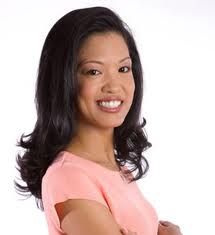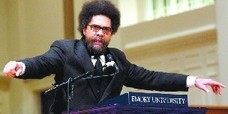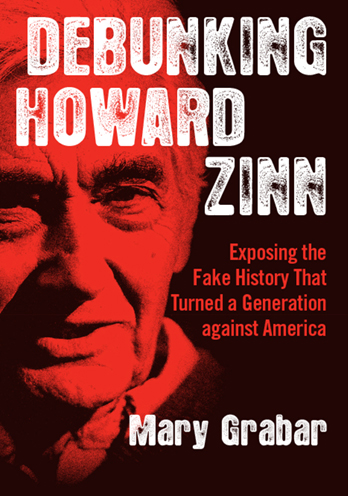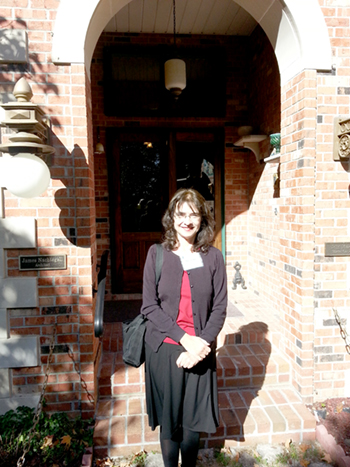 Hello, Michelle Malkin readers! By Mary Grabar, Posted January 25, 2013: Dissident Prof was delighted that Michelle Malkin mentioned her by name yesterday and today. In today's Creators Syndicate column "Readin' Writin' and Deconstructionism," Malkin links back to the Dissident Prof's own article posted January 15 about Florida's Orwellian lessons and writes, "English professor Mary Grabar describes Common Core training exercises that tell teachers to read Lincoln's Gettysburg Address without emotion..."
Hello, Michelle Malkin readers! By Mary Grabar, Posted January 25, 2013: Dissident Prof was delighted that Michelle Malkin mentioned her by name yesterday and today. In today's Creators Syndicate column "Readin' Writin' and Deconstructionism," Malkin links back to the Dissident Prof's own article posted January 15 about Florida's Orwellian lessons and writes, "English professor Mary Grabar describes Common Core training exercises that tell teachers to read Lincoln's Gettysburg Address without emotion..."
In Part I on her series on Common Core, "Rotten to the Core: Obama's War on Academic Standards," she links back to the Front Page article: "Mary Grabar has written about Common Core and Team Chicago's lefties here."
Speaking of Orwellian and Florida, take a listen to a 3-minute recording of a statement by Pam Stewart, chancellor of public schools at the Florida Department of Education.
The article that embeds the recording is titled--aptly--"How A Yellow Dress Explains Common Core Standards." With much feeling, Stewart says, "It is about kids discovering their own. It really will be the thing...that will get at those mission statements...creating lifelong learners because we are no longer making passive learners by the teacher disseminating the information. We're helping students discover it on their own and be able to answer questions they never could before." What could they not answer before? Well, "back in the day," teachers would have simply had students recall factual information--like the color of Sarah's dress. Now teachers will ask Why on this particular day did Sarah choose to wear this particular yellow dress.
But we do not do this recording justice by simply quoting. You must listen to it to gain the full import, the full significance of what Common Core means to this "educator."
Dissident Prof was in Florida telling the Tea Party about this issue, as you may recall. She suggests playing this recording to school boards and before legislators. She predicts a bit of head-scratching as members try to deconstruct the meaning of Stewart's rationale for Common Core, and how being able to say why a girl wore a yellow dress is such a breakthrough in pedagogy.
Well, that's a lesson for fourth-graders.
The week also provided occasions for literary and rhetorical displays of the highest sort. Dissident Prof speaks of the celebration of Martin Luther King's Birthday and the Inauguration of our president.
Here in Republican-strong Cobb County, Georgia, on the eve of the now week-long celebration of Martin Luther King's birthday, none other than Marxist firebrand Cornel West spoke. According to the news report on the university website,
Not sidestepping controversy, West said King would not support the “new Jim Crow” of the criminal justice industrial complex that disproportionately imprisons black, brown and poor people, or the use of military drones to kill innocent people in Pakistan.
In assessing King’s fight against poverty, which West called “the third crime against humanity,” the scholar said King connected his poor people’s campaign to the struggles of poor people around the world — another stance West says constituted a threat because it called into question “how so few people could have so much wealth at the top.”
West implored the largely student audience to avoid the pitfall of making the rule of money, status and position the focus of their attention.
 Professor West, who has taught at Harvard and Princeton, demands between $30,000 and $50,000 per speech.
Professor West, who has taught at Harvard and Princeton, demands between $30,000 and $50,000 per speech.
This week also brought forth an opportunity for Obama speechwriter Jon Favreau to measure his talents to the challenges. He had some help from the inaugural poem that reinforced the idea of identity politics. This time it was the gay people's turn. (Last time it was the black people's turn.)
Dissident Prof knows that many accomplished poets in the past were gay, but she has always felt that that was none of her business. Yet, it appears that engineer-turned-poet Richard Blanco was chosen specifically for that purpose. The announcement in the New York Times was headlined, "Poet's Kinship With the President." And the inauguration is all about the president isn't it? Just like Sweet 16 parties. It is appropriate therefore that the president would choose a poet with whom he has a spiritual relationship as the article indicated:
From the moment Barack Obama burst onto the political scene, the poet Richard Blanco, a son of Cuban exiles, says he felt “a spiritual connection” with the man who would become the nation’s 44th president.
Not only do the two men share a spiritual kinship but both are men of letters. The president's literary masterpiece Dreams from My Father is rapidly replacing the autobiographies of Benjamin Franklin and Frederick Douglass in our classrooms, as Dissient Prof has noted in the past.
Like Mr. Obama, who chronicled his multicultural upbringing in a best-selling autobiography, “Dreams From My Father,” Mr. Blanco has been on a quest for personal identity through the written word. He said his affinity for Mr. Obama springs from his own feeling of straddling different worlds; he is Latino and gay (and worked as a civil engineer while pursuing poetry). His poems are laden with longing for the sights and smells of the land his parents left behind.
Mr. Blanco, we are told, is also working on his memoir, a genre that has become the dominant one and does not diverge much in focus from poetics, the constant song of oneself. (Dissident Prof looks forward to reading about the travails of a "civil engineer"--a long-oppressed group, she is sure.) The inaugural theme "Our People, Our Future" Mr. Blanco said, resonated with him, (although apparently not people in the opposing party who noted the inaugural speech's divergence from the traditionally celebratory to harshly political).
(The site AlterNet, however, celebrated this with the honest headline: "12Ways Obama Smacked Down the Tea Party and the Right in Inauguration Speech.")
Blanco's poem, "One Today," Dissident Prof believes, was an effort to update "Song of Myself," with references to rainbows, coal, MLK's "I Have a Dream" speech, and the victims of the Sandy Hook shooting (though not of the Benghazi attack):
All of us as vital as the one light we move through,
the same light on blackboards with lessons for the day:
equations to solve, history to question, or atoms imagined,
the "I have a dream" we keep dreaming,
or the impossible vocabulary of sorrow that won't explain
the empty desks of twenty children marked absent
today, and forever. Many prayers, but one light
breathing color into stained glass windows,
life into the faces of bronze statues, warmth
onto the steps of our museums and park benches
as mothers watch children slide into the day.
(Dissident Prof remembers watching her own son going down a slide, but does not remember him--or any other child--sliding "into the day.")
The theme continues, nonetheless: "One ground. Our ground, rooting us to every stalk /of corn, every head of wheat sown by sweat / and hands, hands gleaning coal or planting windmills / in deserts and hilltops that keep us warm, hands. . . ."
Dissident Prof does not believe that Mr. Blanco has spent much time on a farm or in a coal mine. In neither workplace do "hands and sweat" do what Mr. Blanco's poetic fancy imagines. Today, we have big machines, but even in days of old wheat was not planted "every head" by hands and sweat. Nor did "hands" "glean coal." She is also confused by the predication: Does one "plant windmills"? And is it the hilltops that are keeping us warm or windmills or coal?
Perhaps we're asking too much. The task of writing inspirational poetry for the launch of a remaking of the government requires so much that perhaps the poet should not be held to minor criteria of grammatical clarity. Surely, the "people"--who were constantly tweeting on the inauguration--get the import without bothering about verbs. Forward.
Some on the other side (who resist the "one" theme) might cynically question the choice of poet, coupled with the rhetoric of the speech, and think it indicates a vote gathering scheme--of guaranteeing not only a Hispanic voting bloc, but the one of Cuban emigres whose history of escape from communist tyranny is being obscured by history and poetry about gay identity politics (with the persecution of gays in Cuba of course conveniently overlooked).
Blanco's poem was an appropriate counterpart to the Speech. The continued references to "one" juxtaposed to the president's references to specific policy agendas like the fictional voter suppression and "war on women," as well as amnesty for illegal aliens, was as cleverly executed as any freshman essay Dissident Prof had ever read.
The words of POTUS (with Jon Favreau):
But we have always understood that when times change, so must we; that fidelity to our founding principles requires new responses to new challenges; that preserving our individual freedoms ultimately requires collective action. For the American people can no more meet the demands of today's world by acting alone than American soldiers could have met the forces of fascism or communism with muskets and militias. No single person can train all the math and science teachers we'll need to equip our children for the future, or build the roads and networks and research labs that will bring new jobs and businesses to our shores. Now, more than ever, we must do these things together, as one nation, and one people.
And . . . .
For we, the people, understand that our country cannot succeed when a shrinking few do very well and a growing many barely make it. We believe that America's prosperity must rest upon the broad shoulders of a rising middle class. We know that America thrives when every person can find independence and pride in their work; when the wages of honest labor liberate families from the brink of hardship. We are true to our creed when a little girl born into the bleakest poverty knows that she has the same chance to succeed as anybody else, because she is an American, she is free, and she is equal, not just in the eyes of God but also in our own.
And . . . .
We understand that outworn programs are inadequate to the needs of our time. We must harness new ideas and technology to remake our government, revamp our tax code, reform our schools, and empower our citizens with the skills they need to work harder, learn more, and reach higher. But while the means will change, our purpose endures: a nation that rewards the effort and determination of every single American. That is what this moment requires. That is what will give real meaning to our creed.
Favreau said this was the most difficult speech to write, and it must have been a challenge to fool the people by framing the radical, progressive agenda with patriotic references to the Declaration of Independence and the Constitution. The president indeed begins with the first sentence of the Declaration: "We hold these truths to be self-evident...." but then immediately segues into "Today we continue a never-ending journey, to bridge the meaning of those words with the realities of our time."
Did you notice that smooth transition? No one, not even that famous progressive president Woodrow Wilson, ever thought of doing that.
That subtle blending of the two concepts of stable, eternal truths with the "realities of our time," leads quite logically to the notion that "preserving our individual freedoms ultimately requires collective action."
 Perhaps the Obama/Favreau speechwriting team felt the American public were sufficiently adjusted to the idea of "remaking the world," having been introduced to the concept in the famous Cairo speech in 2009, "A New Beginning." No doubt the latest call to "remake our government" would be met with approving nods and Tweets to the effect "Dear Leader sez remake gov. Awesome!"
Perhaps the Obama/Favreau speechwriting team felt the American public were sufficiently adjusted to the idea of "remaking the world," having been introduced to the concept in the famous Cairo speech in 2009, "A New Beginning." No doubt the latest call to "remake our government" would be met with approving nods and Tweets to the effect "Dear Leader sez remake gov. Awesome!"
The juxtaposition of collectivist calls to unify in the project of upturning our government and values while chiding the opposing party ("We cannot mistake absolutism for principle, or substitute spectacle for politics, or treat name-calling as reasoned debate") might be Orwellian.
Alas, Dissident Prof believes that too many of young Americans have had their poetic sensibilities destroyed by spoken word events, conflict resolution exercises, Lady Gaga sound waves transmitted to young, developing brains via ears buds, and the forced reading of Maya Angelou in little collaborative groups. They now believe that "dinosaur pooh" (as poetics critic and good friend Tina Trent puts it) is appropriate subject matter for an inauguration, and in Angelou's case the inauguration of William Jefferson Clinton.
The high-flown sentiments on our evolution from dinosaur droppings to coal to native peoples to a melting pot of "the African, the Native American, the Sioux," is posted by University of Wisconsin Professor of Sociology (and not of English) Pamela Oliver. "The Pulse of Morning" opening lines:
A Rock, A River, A Tree
Hosts to species long since departed,
Marked the mastodon,
The dinosaur, who left dried tokens
Of their sojourn here
On our planet floor,
Any broad alarm of their hastening doom
Is lost in the gloom of dust and ages.
Then the rock cries out: "But today, the Rock cries out to us, clearly, forcefully / Come, you may stand upon my / Back and face your distant destiny . . ."
Then perhaps an allusion to the Great Chain of Being?
"You, created only a little lower than / The angels, have crouched too long in / The bruising darkness"
 But let us not deny students their interpretations of "poetry." No doubt, with the aid of the revolutionary new pedagogy of Common Core, students will be able to "discover" and "answer questions they never could before"--like why a character in a book might wear a yellow dress or how windmills are planted (in rows or mounds?) and how "the dried tokens" of the dinosaur left a Rock that cries out, forcefully, "Come, you may stand on my back." Such ability to discover meaning in poetry will no doubt enhance even more the self-esteem they possess as indicated in the American Freshman Survey.
But let us not deny students their interpretations of "poetry." No doubt, with the aid of the revolutionary new pedagogy of Common Core, students will be able to "discover" and "answer questions they never could before"--like why a character in a book might wear a yellow dress or how windmills are planted (in rows or mounds?) and how "the dried tokens" of the dinosaur left a Rock that cries out, forcefully, "Come, you may stand on my back." Such ability to discover meaning in poetry will no doubt enhance even more the self-esteem they possess as indicated in the American Freshman Survey.
We are indeed in a new world, living under the heir to William Jefferson Clinton, connected by like minded poets. Away with the old, English professors tell the dinosaurs of the profession who might complain about this new poetry. This is what Georgia Tech Professor Richard Utz wrote inThe Chronicle of Higher Education:
The English professoriate should embrace, accompany critically, and shape the new discourses its students sorely need to communicate and compete: blogs, video essays, Web comics, digital archives, data visualization, and the like. If these professors continue to hide in disciplinary dead-wall reveries, preferring not to grow with the academic culture and technological change that surround them, I predict students will vote with their feet, and parents with their pocketbooks, to usher in the end of degree programs and departments that rely exclusively on writing, print, and the allegedly carefree days of WordPerfect 6.0.
No doubt students need even more "blogs, video essays, Web comics, digital archives, data visualization, and the like" to understand the words of our most esteemed poets and the president.





